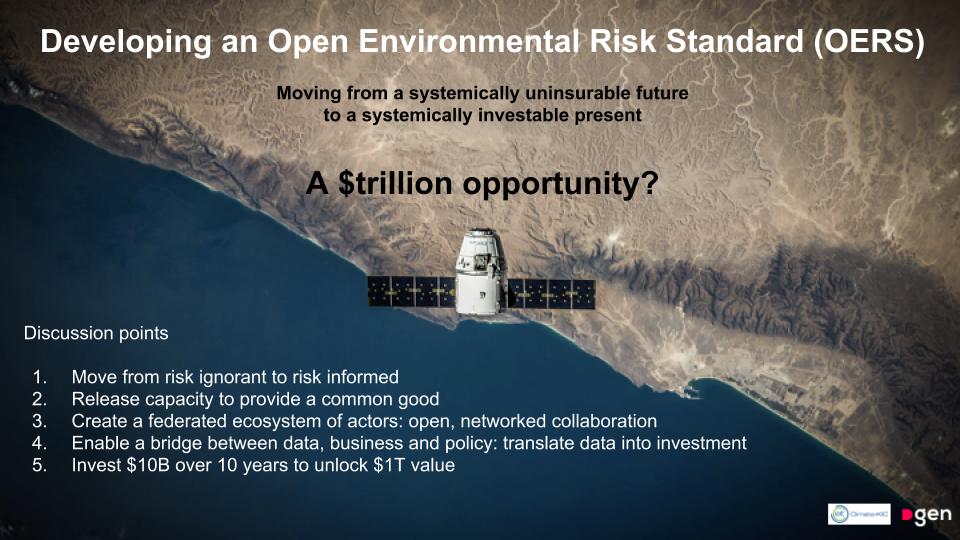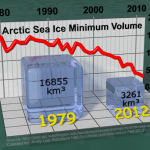Development of the Open Environmental Risk Standard continues: this week, we’ve been working on a one-pager to translate what we’re doing in to more simple words. This is a summary of what we’ve come up with so far. If you would like to comment it’s also available as an open Google Doc (shortlink: http://bit.ly/dgen-ib1-001).
Our challenges
Our societies face risks due to extreme weather and events in a changing climate in the $trillions. Combined with rapid industrialisation of new economies and population growth, the impacts are multi-faceted: they will affect lives, infrastructure and assets.
Our capacity to model these increasingly complex, non-linear risks is not keeping pace with the frequency and severity of extreme weather events, and the uncertainties and the pace of our global development. We are also missing opportunities to innovate and create new solutions using the tools we have created over the last 30 years.
Our opportunities
For infrastructure owners, the opportunity is to better prepare for disasters and to have greater transparency of the systemic, nonlinear risks being faced.
For institutional investors, the opportunity is to actively manage risk exposure and to transform potential losses into sustainable returns.
For insurers, the opportunity is to provide new class of insurance combined with market standard risk transparency and openness and to create new investment opportunities.
For policy-makers, the opportunity is to ensure that infrastructure investment contributes to reduced physical risk, to help increase marketplace resilience, and to enable new products and services to emerge.
For National Disaster Management Offices (NDMO), the opportunity is to accurately model and understand the risks faced and to better prepare for, or prevent, the loss of lives, livelihoods and disruption to homes and businesses.
The way forward
We all need a better way of making our money work to keep things safe instead of paying for things once they have broken.
We must act together to protect our citizens, our property, our markets and our businesses.
Our challenge is to ask how might we combine the wealth of nations, machines and humans to unlock the $trillions required to create a resilient, low carbon economy.
In this, the 30th anniversary of the Web, we are in an unprecedented era. We have instrumented the world, connected billions of people, millions of companies and hundreds of countries with the web of data. Learning from open standards, such as the Open Banking Standard, we have the opportunity to create new categories of data portability to underpin open marketplaces.
Our programme, codename Icebreaker One, will combine expertise in policy and business innovation to harness the new tools and infrastructure now available to us, at scale.
Our focus
Icebreaker One will target infrastructure due to its vested interests in resilience, substantial exposure to climate risk, and need to unlock new funding mechanisms. This will enable better decisions to be made and provide better decision-support on the uncertainties faced today.
Based on user needs, we will be defining specific use-cases and actors, ecosystem boundaries and the core data infrastructure within scope. We will ask how the web of data could improve risk modelling for an insurer, what legal, commercial policy and technical frameworks could transform the market: from how to better price resilience to defining new financial instruments to enable pre-investment. The aim is not to produce a situation where we are just insuring the risks.
Based on the transformative power of the web of data (ranging from global geospatial data to self-reporting assets) we will explore and define how data rights, licensing, liability, privacy and security can be addressed to unlock new models, products and services. We will also consider the adverse effects of data.
Our process
Six working groups, working with a core governance group, will feed into the development of joined up frameworks for culture, policy, making, learning, standards and data infrastructure.
The culture group will create compelling narratives for peers, professionals and policy-makers.
The policy group frame the regulatory and legal environment which could support the work, including potential licensing models.
The making group will identify user stories that connect specific problems, stakeholders and data, and identify innovations that could be enabled the standard.
The learning group will explore business models through use cases and direct research.
The standards group will addressing both human and machine standards and how they might interoperate to support collective intelligence.
The data infrastructure group will determine the scope of foundational data to be included and why, taking a view on architecture, interoperability, security, discoverability and usability.
We will publish our draft report in May 2019.
For more details see http://dgen.net/oers





